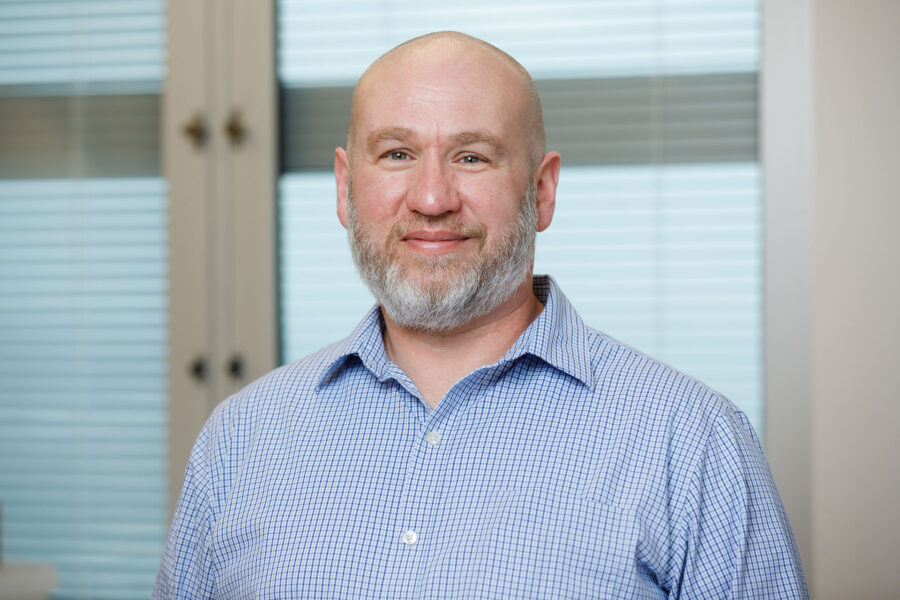It’s not unusual for academic researchers to explore and test an array of different programs and work environments before finding where they fit best. The career of Eric Carnes, PhD, associate professor of environmental, agricultural and occupational health at UNMC, is no exception.
As a young man, he nearly attended a naval academy but pivoted at the last minute to study for a degree in chemical engineering. As he neared the end of his bachelor’s degree, something shook the foundations of America and his career — the September 11, 2001, terrorist attacks.
“After 9/11, of course, the country froze and, with it, the economy,” he explained.
Along with millions of other Americans, he found that employment opportunities were slim while the nation tried to recover.
So, he pivoted again, deciding his best option was engineering graduate school, with an eye toward medical school. His pre-med courses were mostly biology and biochemistry — and there he found a path that felt right.
In 2001, biomaterials and bioengineering weren’t established fields of study, but one of his professors was beginning work in those areas. The soon-to-be Dr. Carnes devoured every available bit of information he could and graduated with a doctorate in chemical engineering.
During his studies, Dr. Carnes contributed to a project involving the development of artificial cells.
“We wanted to make these cells do all this stuff — we were Frankensteining parts of different cells together,” he said. “How great is that? I felt really lucky to be on the cutting edge of science, doing something critically needed to keep people healthy.”
The research eventually developed commercial potential as a delivery tool for cancer treatment, which was gratifying in terms of helping patients but brought challenges as the product was commercialized.
“The focus switched to the commercial side, and I missed the science,” he said. “I realized, to be happy I needed to be working toward a research mission.”
So, another career pivot led him to Sandia National Laboratories to work on defense projects, where he did indeed find an important mission — pharmaceuticals for such horrifying diseases that everyone hoped they would never be used.
Then, he heard about the University of Nebraska System and its new University Affiliated Research Center, the National Strategic Research Institute, which was designated by the Department of Defense and sponsored by U.S. Strategic Command in 2012. He soon joined UNMC and began leading and contributing to projects through NSRI. He was named to the inaugural cohort of NSRI Fellows in 2021.
“My work for the institute, in combination with being at this great university, allows me to have everything I wanted — control over what I was working on and products we can put into people’s hands,” Dr. Carnes said.
Dillon Cunningham, NSRI research director for biological defense programs, has worked with Dr. Carnes for more than a decade.
“The strategic pairing between the university and NSRI creates natural engagement points with highly technical staff such as Dr. Carnes,” Cunningham said. “These engagement points help ensure the DOD retains academic relevance on topics critical to national defense while facilitating development and academic exploration opportunities needed to house these technical staff in the first place.
“Dr. Carnes’ expertise in drug delivery makes him an ideal strategic resource in many efforts.”
Working in academia gives Dr. Carnes the opportunity to pursue another passion as well — developing the next generation of researchers.
“Many of the things I’m most excited to see won’t come to fruition in my lifetime,” he said. “My goal has been to develop people who can carry out these projects to their greatest potential.”
UNMC is a teaching university, and NSRI aims to support students however it can.
“The institute gives us many unique options for working with students,” Dr. Carnes said. “We can get interns through the undergrad program, for example, or choose graduate assistants to join our projects.”
He appreciates the real-world exposure NSRI offers to both professors and students. NSRI serves as a highly experienced and engaged champion for NU capabilities and connects solutions to DOD challenges.
“I don’t want my research to just end up in the literature where someone will come across it in 20 years,” Dr. Carnes said. “I need to be out there doing and making things. I want to push to get products out the door and into people’s hands, so I feel like we really did something.”
